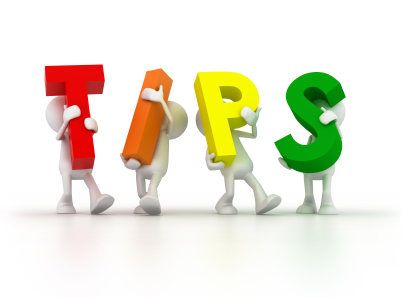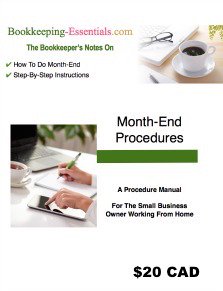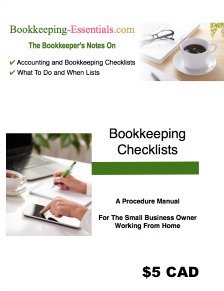Small Business Basics
Accounting & Bookkeeping Tips
by L. Kenway BComm CPB Retired
What You'll Find In This Chat

This whole site is jam packed with home business bookkeeping and accounting tips ... Over 40 alone on this page.
Many of the tips are presented in the form of a bookkeeping question.
You will find they fit into one of the five categories which are found further down this page. I see them as the different roles that you, as a small business owner, switch in and out of when dealing with the numbers in your business ... bet you didn't know there were so many "people" in your accounting department! ;-)
The Bookkeeper's Tips

Here are my top five basic bookkeeping tips:
- Always keep your business finances separate from your personal finances. Don't give the tax auditor a reason to audit both. Learn to pay yourself first and run your business on the remaining cash. By this I mean setup an automatic payment to your personal account twice a month (1st & 15th or 10th & 25th) like a regular pay cheque.
- File all your tax compliance reports on time to avoid penalties, even if you can't pay the amount owing. However if you begin the habit of putting money aside in a separate account to pay your taxes, you will never have this problem. Start today. Put 15% of all cash received by your business into a separate account. I recommend this account be at a different bank than your current business and personal accounts. I like to use one of the online banks for this like Ally, President's Choice Financial or Tangerine.
- Keep organized by:
- developing a method for handling all your paperwork;
- entering your bookkeeping data in batches;
- actively managing your cash flow; and
- reviewing your bank statement and financial reports monthly.
- Audit proof your records.
- Keep all your receipts, no matter how small the amount and make sure they are legible. Receipts you must keep include debit receipts and credit card receipts.
- Deposit all your business cash flowing into the business ... so you can prove what was income (taxable) and what was contributions or loan proceeds (not taxable).
- Whenever possible, don't go into debt to run your business. Run your business on your existing cash flow. Not enough cash flow to cover expenses? Figure out where to cut your expenses and consider not offering credit to your customers because you are not a bank. Let your customers pay by PayPal or a similar solution that accepts credit cards. Keep a business journal to diarize your logic for your business ventures. It will help show you incurred the expenses with the expectation of profit. Consider implementing Mike Michalowicz's Profit First system (US readers click here instead).
Don't know how to implement my top five basic bookkeeping tips? Browse through this site to learn how.
Start by reading some of the tips below to learn about:
... good bookkeeping practices for your home based business;
... Canadian tax deductions available to you; and
... how to choose your
bookkeeping system;
... even how to keep tabs on (supervise) your
bookkeeper's work (if you have one).

When you find a bookkeeping tip you are interested in implementing, just click the link to find out how to do it.
We'll chat while you sip a nice hot cup of tea ... or the beverage of your choice. How about a cuppacina? :O)
If you just want steps to follow to do your own bookkeeping, it's not quite as simple as that. You will still need to read some articles.
To quote Ken Evoy (the creator of the web tools I used to build this site),
"Successful people do two things especially well...
- Persevere.
- Fix mistakes.
Go to it. :-)"
So use the bookkeeping tips on this page and scattered throughout this site to help you persevere and fix your bookkeeping mistakes.
You Don't Know What You Don't Know
The purpose of this chat is to provide you links as a quick method to locating information on any one of the categories such as accounting, tax or bookkeeping tips.
Sometimes the information is presented in the form of a question because when you are learning something, you don't always know what the questions are.
If you are like me, once I see a point or question in writing, the light bulb comes on and I find myself saying "Yeah I was wondering about that." or "Oh, that's what I'm supposed to do!"
With the bookkeeping tips presented this way, you don't have to read entire articles. You can focus only on what you are interested in today. Tomorrow, it may be another subject, another problem, or another question you have.

New information and new pages are added regularly ... so enjoy your cup of cinnamon tea and apple while you click and poke around to see what's here. Bookmark this page so you can visit as often as you want.
I hope you find these basic bookkeeping tips helpful and practical.
Enjoy Your Visit Today,
Your Tutor Lake
Basic Bookkeeping Tips For Each ...
Accounting Position in your Department :O)

Basic Accounting Tips
Tips for "The Accounting Manager" to help you become at ease with the numbers side of your business.
- Are you running your business or is it runnnnnnning you?
- Do you have a management reporting package?
- Financial reporting is an important tool to help you make better business decisions.
- Is there an easy way to figure debits and credits out?
- Learn to think your way through an entry using my cheat table.
- As a small business owner you want to practice Management Accounting not Financial Accounting.
- Do I have to keep all my debit receipts and credit card receipts?
- The short answer is yes. The long answer can be found by reading this article, Record Retention Guidelines for Record Keeping. This bookkeeping tip, if implemented, can save you a lot of anguish if you are ever audited.
- Can I recover my GST input tax credits pertaining to my start-up costs? I have heard conflicting opinions on this.
- The answer is yes if ... find out how in this article on GST Registration ... Should I? ... Must I?. It's a tax planning opportunity you don't want to miss!
- Which financial statement lets all who see it know the financial health of your business?
- Monitor it closely.
- Which financial statement breaks down your profitability?
- Run your business better, more efficiently and head off problems
- How do you benefit from investing your time in an accounting system that works for you?
- I hire a bookkeeper. Do you have a bookkeeping tip on how can I keep tabs on the work being performed?
- Hint Learn this management skill on how to supervise your bookkeeper.
- What is a comparative income statement or a comparative balance sheet?
- A comparative statement means that the current period figures are being compared to a previous period. The comparative period may be the prior period (compare this month to last month) or it could be for the same time period in the previous year (compare this month to the same month last year). It helps you put the numbers in perspective and allows you to watch for trends (sales are down but expenses are up) so you can be proactive in managing your business.
- Honestly, do I really have to have an auto log?
- Don't miss this bookkeeping tip.
- I just received a notice that I am going to be audited? Should I be worried?
- No, it is not a cause for concern if you have been practicing good bookkeeping. It's more of an inconvenience. Read more on this subject in Understanding Tax Audits. However if you have filed tax returns that misrepresented your financial situation or you were fraudulent, that's a different story.
- The number for inventory on my balance sheet never changes. Is there something I should be doing?
- To answer this question, you need to know what the difference is between periodic inventory and perpetual inventory.
- How do you record the owner's personal use of inventory?
- This question was asked and answered in The Bookkeeping Forum ... Bookkeeping for Owner's Personal Use of Inventory.


Basic Bookkeeping Tips
Tips for "The Book Keeper" on how to achieve an organized filing system and accurate accounting records.
- Can I throw away the monthly statements I receive from my suppliers because I have already recorded their individual invoices?
- No don't throw them away. Here's what you should do.
- How often should I stop and reconcile my bank statement to the actuals posted in my accounting ledger?
- Every month you should reconcile your bank AND credit card statements.
- Keep a listing of all your pre-authorized direct deposits and withdrawals to make reconciling your accounts easier.
- Keeping your manual cheque register up-to-date also helps reconciling your bank account easier.
- Determine if your lease is an operating lease or a capital lease before you book your transaction.
- One can be expensed, the other cannot.
- What is an owner's draw? How do I record the draw in the books?
- Hint - Think, "How do I pay myself?".
- Stumped? It's two months later and with all the computer codes, sometimes it is hard to remember what that receipt is actually for?
- Develop this routine now while things are simple. Hint - It involves becoming familiar with your chart of accounts.
- What is the correct way to book my monthly loan payment for equipment I purchased for the business?
- This is a tricky entry because you must pull out the interest expense and book it to a separate account. Read more.
- What are source documents? Are they the same thing as supporting documents?
- All the bookkeeping tips in the world won't do you any good without your source documents for backup to support the validity of your transaction.
- Why do I need a separate business bank account AND credit card?
- If you were going to implement only one bookkeeping tip ... choose this one!
- Do not forget to do this annual GST/HST task
- I learned this adjustment from The Jacks Institute Small Business Tax course. Once a year on your GST/HST return, add back 50% of your ITC pertaining to meals and entertainment expenses on line 104 if you claimed 100% of the GST/HST on meal expenses (and entertainment) throughout the year. If you use QuickBooks, you can setup a sales tax code M for meals and have the rate set to 50% of the current GST/HST rate. If you do this adjustment as you post each transaction, you will not have to make any annual adjustment. However, this may not be the best method for you if you have some meal and entertainment expenses where the 50% limit does not apply. Learn more about GST/HST in A Guide to Understanding GST/HST.
- What is the correct way to reimburse myself from the business for purchases I made from my personal funds?
- You need to know this bookkeeping tip.
- How long do I have to retain my records before I can legally destroy them?
- This question is answered in "The Practice" section. It also gives you bookkeeping tips about what records and source documents you must keep.

Basic Accounting System Tips
Tips for "The Systems Tech" on ensuring your accounting system meets your needs, and runs smoothly.
- If all you want your bookkeeping system to do is prepare your annual tax return, here's a simple filing method that works.
- There are so many choices when it comes to setting up the books. How can I evaluate my business needs and build a system that is right for my business?
- Why do I need an audit trail?
- This is one bookkeeping tip you need to implement.
- Are you are just starting out and don't have a lot of transactions?
- Here is a simple bookkeeping system that may meet your needs.
- How do you determine if your accounting reports are providing the right amount of useful information?
- Here are five questions to help you figure out the right solution for you.

Basic Tax Compliance Tips
Tips for "The Tax Preparer" on meeting Canadian government tax compliance requirements at the least cost to you.
To my U.S. visitors, I try to place links on U.S. tax throughout this site for you whenever possible. While U.S. tax law is different from Canada, many of the principles are the same. Feel free to you use my information as talking points with your accountant.
- What is a legitimate receipt for tax purposes in Canada? ... in the U.S.?
- Hint - Not cancelled cheques.Not credit card statements. Not debit payment slips. Maybe not even a credit card slip!
- I had to move out of my home office. Is my drive to my new office a business expense for tax purposes? This information applies to Canada and the U.S.
- Hint - Maybe!
- As a self-employed business owner in Canada, what is my tax filing deadline?
- Hint - Not April 30th.
- What is considered the "official" receipt date at the CRA? ... the IRS?
- Hint - It is not the post mark date nor the date you make your payment at the bank.
- Don't get caught with penalty and interest charges because you didn't know the rules.
- There are different payroll filing deadlines in Canada for special situations such as the death of an owner, closing of a business or bankruptcy.
- I know some expenses are not deductible for tax purposes in Canada or there is a limit on what can be deducted. Can you explain what they are?
- Check out this tax planning article on Home Business Taxes for a few bookkeeping tips on the subject.
- I am incorporated in Canada and I don't owe any taxes.
- Can't pay the taxes owing?
- Learn how to at least minimize the pricey penalty charges.
- Taxes are due April 30 regardless of the filing date you choose.
- Learn how to avoid interest charges on taxes owing when opting for the June 15th filing date. Hint - The word starts with the letter E.
- What is the difference between tax avoidance and tax evasion?
- Do you know how to get into trouble with Revenue Canada or the IRS?
- What is the difference between skimming and moonlighting?
- How can a bookkeeper get their client's employer to reduce the tax withheld at source on a family member's paycheque so that the tax refund is not so large at year-end?
- Fill out CRA form T1213.
- Wayne Davies is a U.S. tax accountant and the author of an article entitled "What Does It Take to Pay Zero Taxes?"
He tells you not to believe your friend who brags to you they don't pay taxes. In the article, he explains there are only 5 ways this can be true.
- Your friend is a liar.
- Your friend cheats on his tax return by not reporting all income earned or deducting bogus expenses.
- Your friend is stupid to think that having no tax balance owing or receiving a tax refund means no taxes were paid.
- Your friend is broke. He may pay no taxes because he is not making any money.
- Your friend is just getting by. The business may be just barely making a profit ... enough to get by on.

I don't do numbers ... really!
Tips from "The HR Manager" just in case you are getting discouraged and thinking you can't do it. You can do it! Remember, the turtle wins the race ... and practice makes perfect.
- No bookkeeping tips or bookkeeping questions here.
- I just want to know - are you having fun yet?
- If you have started to get really, really interested in the numbers side of your business, checkout these websites on basic accounting training for small business owners that do not have a financial background.
- Are you terrible with numbers ... maybe even fear them?
- Discouraged that you will never catch on?
- Are you confused? Here's a tip.
- All the bookkeeping tips in the world aren't going to help if you lose your health. I learned the hard way that you need to find ways to relieve stress to stay healthy.
- Here is a quick method to managing stress, or
- Maybe a 30 second stress break might work for you.
- It's so easy to become discouraged .. especially if you are tired, frustrated, or worrying about money. Here are some links to quotes I've placed throughout the site. Maybe one of these "basic bookkeeping tips" will be enough to renew your energy to continue ...
- On opportunity
- On success
- 3 rules
- On regret
- On hard work
- On time
- On dreams
- On mistakes
- "What do you do that makes you happy? Just you." The School of Essential Ingredients by Erica Bauermeister
- Perhaps some humour will give you a pick me up ... I know this isn't really about bookkeeping tips, but if you follow the links on Advice ... with Dr. Julia Chicken ... perhaps, just perhaps ... life will come back into perspective.
You've come to the end of the basic bookkeeping tips for this page .... but this is just a sample. This site has many more practical and useful bookkeeping tips ... some aren't taught in formal education programs. Please visit often ... I hope you enjoy my site.
If you are wondering where to visit next, may I recommend the following pages:
- The Practice - Good Book Keeping Practices, Audit Trails ...
- The System - Learn the Criteria to Evaluate Your Accounting System
- The Financials - How to Read, Evaluate, and Review Financial Statements
Bookkeeping Essentials › Tips
Enjoy A Tea Break With
Me Today. Let's Chat!
Use the search feature to quickly find the
information you're looking for.
Join Me On Facebook
Help support this site by "liking" me! Here's where I post current information.
Listed Under Websites NOT Local Business.
This website is NOT associated with the business operating in Bonnyville AB.




